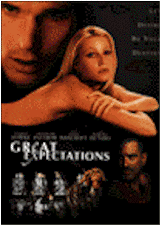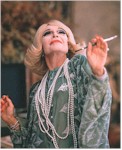|
| |
Great Expectations
Review by Carrie
Gorringe
Posted 30 January 1998
 |
|
Directed by Alfonso Curaron Starring
Ethan Hawke, Gwyneth Paltrow,
Hank Azaria, Anne Bancroft,
Chris Cooper, and Robert De Niro
Screenplay by Mitch Glazer,
based on the novel by Charles Dickens |
"She’ll break your heart," cooes the
mad Ms. Dinsmoor (Bancroft) to a young Finn Bell as he stares, entranced, at the
disdainful and beautiful Estella. Of course, anyone who is familiar with the Dickens
classic will immediately realize that Finn is ensnared beyond any hope of rescue, and
will, naturally, spend the rest of his life – or, at least, that portion of his life
deemed interesting by novelist and filmmaker – in pursuit of the impossible. Modern
audiences may not find this updated version to their taste, it being at times more of an
academic exercise in book-to-film adaptation that leaves out much of the emotional
conflicts that drove Dickens’ hero to a nearly self-destructive course of action. On
the other hand, Dickens’ tale of obsessive love and hate – and the difficulty
one often has in distinguishing between the two – is hardly without an overwrought
emotional flavor. This is the novel, after all that has as its metaphorical centerpiece a
rotting wedding cake, now home to countless spiders and mice – the symbol of true amour
fou that has been distilled into an emotionally noxious libation, and still manages to
dredge up a happy ending in spite of all the emotional whipping that has come before it.
Curaron and Glazer, mercifully, spare us the potentially anachronistic and unappetizing
metaphors that acted as emotional buffers to the torment contained within the novel’s
pages, and instead go straight for unbridled, baroque heat. Unlike last year’s
adaptation of Romeo and Juliet, with L.A. street gangs waxing too poetically with
the Bard’s dialogue transplanted verbatim, this version of Great Expectations
is thoroughly modern, and almost entirely laudable in its aims and achievements.
The scene of the would-be crime has been shifted from Victorian London to the lush
tropicality of Florida, in a decaying Southern plantation named Paradiso Perduto (the
setting and tone resemble nothing so much as a setting from one of Robert Aldrich’s
1960s mad-woman melodramas – Hush, Hush, Sweet Charlotte immediately comes to
mind and/or Tennessee Williams gone to seed).  Within the gates of this lost paradise, the
embittered Ms. Dinsmoor plays cha-cha records, swills martinis by the pitcherful and fumes
over her missed opportunity to disengage herself from her virginity some fifteen years
earlier (at age forty-two!) in a manner befitting a good Southern girl (i.e., in the
marriage bed). With the loss of her "gentleman caller," Dinsmoor has, she
believes, learned the bitter truth about dependence upon the kindness of strangers. The
grown-up Estella (Paltrow) is Dinsmoor’s ticket to revenge upon the entire male sex;
through the entrapment of Finn (Hawke), Dinsmoor wants another to feel her pain. Finn
nearly fulfils Dinsmoor’s destiny for him, except for one little incident beyond her
control: prior to encountering the malevolently distaff atmosphere at Paradiso Perduto,
Finn gave assistance to an escaped convict named Lustig (De Niro). At the point of
Finn’s deepest despair, a lawyer appears, promising the talented young artist a
chance to have his own one-man show in New York. His guardian, Joe (Cooper), encourages
him to take the opportunity. Just as Finn is beginning to get back on his feet, in sails
the spiteful Estella, clad in skintight Donna Karan, who toys with him over whether or not
she should marry another man. Then Lustig reappears to deliver more revelations to him,
and it’s difficult to tell which apparition from the past is more unwelcome. Within the gates of this lost paradise, the
embittered Ms. Dinsmoor plays cha-cha records, swills martinis by the pitcherful and fumes
over her missed opportunity to disengage herself from her virginity some fifteen years
earlier (at age forty-two!) in a manner befitting a good Southern girl (i.e., in the
marriage bed). With the loss of her "gentleman caller," Dinsmoor has, she
believes, learned the bitter truth about dependence upon the kindness of strangers. The
grown-up Estella (Paltrow) is Dinsmoor’s ticket to revenge upon the entire male sex;
through the entrapment of Finn (Hawke), Dinsmoor wants another to feel her pain. Finn
nearly fulfils Dinsmoor’s destiny for him, except for one little incident beyond her
control: prior to encountering the malevolently distaff atmosphere at Paradiso Perduto,
Finn gave assistance to an escaped convict named Lustig (De Niro). At the point of
Finn’s deepest despair, a lawyer appears, promising the talented young artist a
chance to have his own one-man show in New York. His guardian, Joe (Cooper), encourages
him to take the opportunity. Just as Finn is beginning to get back on his feet, in sails
the spiteful Estella, clad in skintight Donna Karan, who toys with him over whether or not
she should marry another man. Then Lustig reappears to deliver more revelations to him,
and it’s difficult to tell which apparition from the past is more unwelcome.
 This film is
nothing if not psychological territory scraped raw over and over again, and the scraping
is done with such self-assurance at all levels that it’s a delight to watch for those
in the mood for a good, old-fashioned, emotional wallow. By no means is it Brief
Encounter on steroids, but it does provide a reasonable enough facsimile of such an
approach. Curaron provides Great Expectations with a sumptuously corrupt feel;
it’s like watching an overripe peach on the verge of rotting. The performances, by
and large, supplement this overall atmosphere. Paltrow has the elusive mix of come-hither
glances and psychological armor down pat. Hawke lifts the specter of the tormented,
love-obsessed artist above the level of cliché. De Niro infuses Lustig with a great deal
of vulnerability and tenderness, especially in the later scenes; it is the most likeable
and layered performance he has given in some time. This film is
nothing if not psychological territory scraped raw over and over again, and the scraping
is done with such self-assurance at all levels that it’s a delight to watch for those
in the mood for a good, old-fashioned, emotional wallow. By no means is it Brief
Encounter on steroids, but it does provide a reasonable enough facsimile of such an
approach. Curaron provides Great Expectations with a sumptuously corrupt feel;
it’s like watching an overripe peach on the verge of rotting. The performances, by
and large, supplement this overall atmosphere. Paltrow has the elusive mix of come-hither
glances and psychological armor down pat. Hawke lifts the specter of the tormented,
love-obsessed artist above the level of cliché. De Niro infuses Lustig with a great deal
of vulnerability and tenderness, especially in the later scenes; it is the most likeable
and layered performance he has given in some time.  Even Bancroft pulls off her late Bette-Davis
posturing by giving it far more oily charm and less overblown emotional amplitude than the
prototype ever did. The overall effect provided by the film is one of an almost-sensual
beguilement, beginning with an incandescent, unreal visual style, filled with mysterious
shadowing and diffused lighting that nevertheless glows with an unabashedly decadent feel
(even the darkest of rooms featured seem to shimmer more than perhaps might be thought
decent). The film slinks confidently through its paces, like a femme fatale with a
strategically-bared shoulder, daring you to think your worst. If there is one false note
about the film, it may stem from the negligence displayed by Curaron and Glazer in
omitting the novel’s revelations concerning the relationship between the convict and
Estella (he was her biological father); the preservation of it might have injected a
somewhat greater sense of irony and loss to overcome some of the stasis into which the
film falls in its final scenes. Despite that one potential flaw, Great Expectations
does indeed live up to its own title. Even Bancroft pulls off her late Bette-Davis
posturing by giving it far more oily charm and less overblown emotional amplitude than the
prototype ever did. The overall effect provided by the film is one of an almost-sensual
beguilement, beginning with an incandescent, unreal visual style, filled with mysterious
shadowing and diffused lighting that nevertheless glows with an unabashedly decadent feel
(even the darkest of rooms featured seem to shimmer more than perhaps might be thought
decent). The film slinks confidently through its paces, like a femme fatale with a
strategically-bared shoulder, daring you to think your worst. If there is one false note
about the film, it may stem from the negligence displayed by Curaron and Glazer in
omitting the novel’s revelations concerning the relationship between the convict and
Estella (he was her biological father); the preservation of it might have injected a
somewhat greater sense of irony and loss to overcome some of the stasis into which the
film falls in its final scenes. Despite that one potential flaw, Great Expectations
does indeed live up to its own title.
Contents | Features
| Reviews | News | Archives | Store
Copyright © 1999 by Nitrate Productions, Inc. All Rights
Reserved.
| |
|